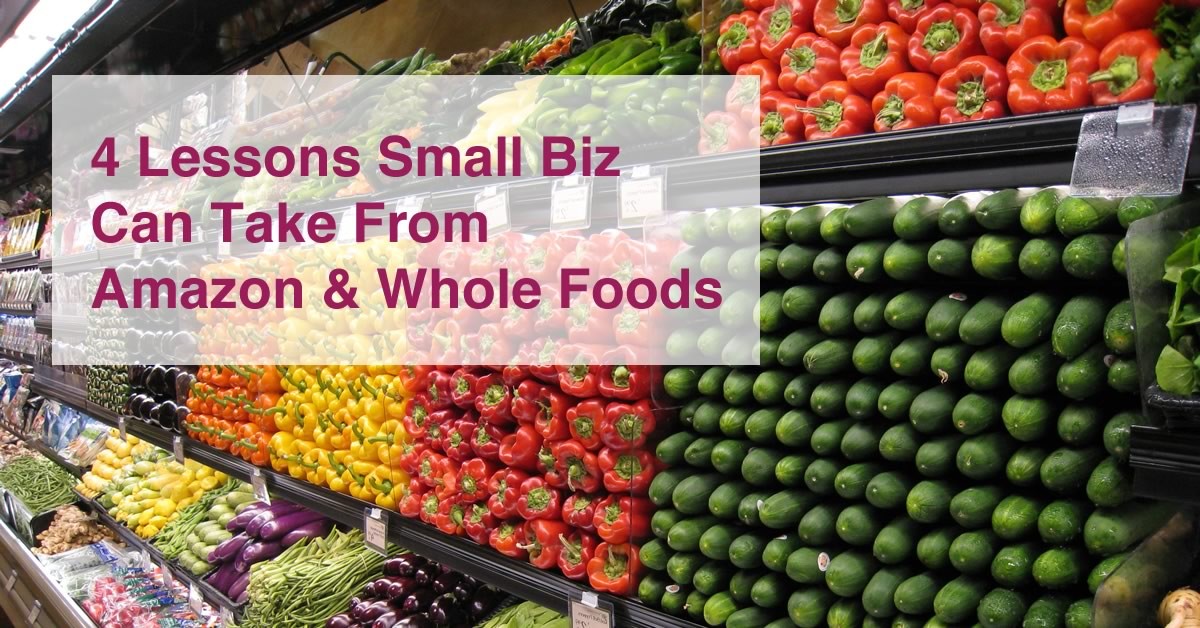With all the talk of the $13.7 billion cash deal for Amazon to buy Whole Foods, most people are just talking about it in relation to the retail industry and what it will mean for its future. I think small business owners should be looking at it to see what they might be able to learn from the deal that can be applied to their own businesses, though.
Having been in the internet industry for 21+ years, I know that everyday business owners can come up with great ideas that transform their businesses and their lifestyles. I've worked with many of them, and have friends who've used the internet to build wildly successful businesses that let them live life on their own terms.
You have to keep your mind open and, more importantly, dare to dream about what you really want out of your business. Here are 4 of the many lessons you can take from the Amazon - Whole Foods deal:
- Online + Brick & Mortar = Power. The reality is, you don't want all your eggs in one basket. For real power and stability, a combination of traditional and online is the strongest. Even the tech giant Amazon recognizes that brick & mortar has a place. Did you know they're even building physical bookstores now?
They're doing it differently, though. Of course. No prices on books (you have to scan them with the app or take them to a scanning machine, and then you'll see two prices: one for Prime members, one for everyone else). Their stores are really about marketing their entire company to customers, continuing their strategy of building lifelong relationships with them.
Another consideration is that a business that's entirely online could be wiped out as a result of a major tech interruption, whereas a brick & mortar should at least be able to operate in some capacity. Not to be fatalistic, but there's the very real potential for a crippling electromagnetic wave to occur at some point, and companies need to have something that can fill the gap if the Internet and other technology is down.
Of course that means probably all cash transactions and very likely no refrigeration or lights in stores since power will likely be interrupted, but that's a different story. Read One Second After by William R. Forstchen if you want to freak yourself out over the possibilities :) - Use your imagination - and execute. In the 90's everyone thought Amazon was just a bookstore, but it's really always been a tech company that happened to start out with books. Jeff Bezos is just brilliant at taking everyday products and extrapolating a way for them to be better on the web.
CTO Werner Vogels is quoted as saying "Why did Jeff start Amazon; why did he start a book shop? There were things that you could do with books that you couldn't do anywhere else. A really, really large book shop may have 40 to 50 thousand titles in stock...It's a pure technology play."
Bezos knew he wanted a technology company and he backed into the product offering by analyzing what was the most adaptable. He picked books because of their low cost and universal appeal, but of course he did everything else differently from every other bookstore that has ever existed.
The combination of imagination and execution is killer. - Niching down is profitable. Whole Foods has made it a priority to cater to its defined target market, and this niching down is likely a large part of the reason that Amazon chose to buy Whole Foods over other grocers. Their customer base is very loyal and willing to drive long distances to shop there. (though it's kind of ironic when someone drives a 170-mile round trip to buy organic food if they're doing it because they want to buy environmentally friendly products)
Amazon knows that Whole Foods customers shop there because it's their preference, not because of a weekly sales sheet. That customer loyalty goes right along with the customer loyalty that Amazon works hard to build.
By niching down, you can more highly target the customers you want and serve them more effectively, and this leads to being able to charge higher prices. As a matter of fact, often the more a business charges for its products or services, the more people want to buy from them. That old reverse psychology at work. - Know your market. Amazon recognizes that the type of people who shop at Whole Foods are also the type of people who will be interested in their tech advances in grocery delivery.
Since many drive long distances to shop at Whole Foods, they'll love the opportunity to have a drone deliver groceries to their home. And since many of them like feeling like they're different from the masses, in exchange for the opportunity to be early adopters they'll likely tolerate the learning curve while Amazon works out kinks in the system.
Now, how can you apply these 4 lessons to your own business? Get in a quiet place, relax, try to imagine yourself as Jeff Bezos, and see just what ideas you may be able to come up with.
Write them all down regardless of how crazy they may seem, and let them marinate. You never know when one might just turn out to be a winner!
And keep writing down ideas throughout your regular days. If you get used to thinking like this you'll be surprised at just when an idea might pop into your head. I get my best ideas when mowing the grass - no joke!
The important thing is to train yourself to think differently and not be afraid of experimenting. That's how you'll break free of your assumptions and find real opportunity.
